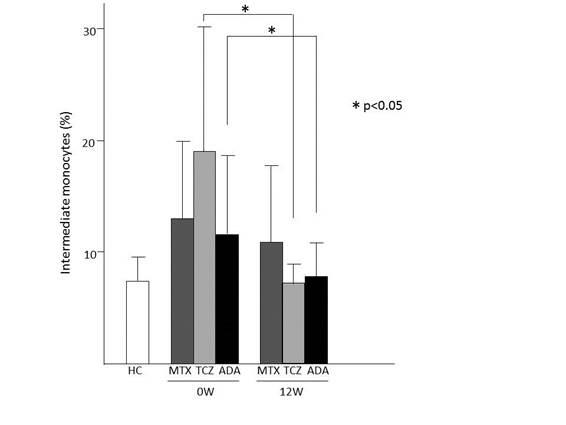Session Information
Date: Sunday, November 8, 2015
Title: Rheumatoid Arthritis - Human Etiology and Pathogenesis Poster I
Session Type: ACR Poster Session A
Session Time: 9:00AM-11:00AM
Background/Purpose: Recently, three different
subsets of circulating monocytes: CD14brightCD16- (classical), CD14brightCD16+
(intermediate) and CD14dimCD16+ (nonclassical) monocytes have been defined.
It has been reported that circulating intermediate subset increased in coronary
artery disease and inflammatory disease such as infection and auto-inflammatory
disease. However, the pathogenesis of increase of intermediate monocytes in inflammatory
condition is still unclear and the relationship between cytokines and
intermediate monocytes is unknown particularly in rheumatoid arthritis (RA). The
purpose of this study is to investigate influence on intermediate monocytes by anti-cytokine
treatment in patients with RA.
Methods: 32 RA patients and 14 healthy control
subjects (HC) were enrolled in this study. All patients had never received a
treatment with methotrexate (MTX) or biological agents. Peripheral blood
samples and clinical records of the patients were obtained at the time of 0, 12
and 24 weeks after treatment. Peripheral blood samples were also obtained from HC.
The expression levels of CD14 and CD16 on monocytes were measured by flow
cytometry (FCM).
Results: 8 patients received anti-IL-6
receptor antibody, tocilizmab (TCZ) treatment alone, 12 patients received anti-TNF-a
antibody, adalimumab (ADA) with MTX treatment and others received only MTX
treatment. FCM analysis revealed that the proportion of intermediate monocytes
significantly increased in patients at baseline compared with HC. The
proportion of intermediate monocytes significantly decreased after TCZ and ADA
treatment (p=0.029 and p=0.012, Fig 1). The proportion of intermediate
monocytes were significantly and positively correlated with DAS28-ESR score (r=0.47,
p<0.01) and DAS28-ESR score decreased in accompany with the proportion of
intermediate monocytes after inhibition of inflammatory cytokine signal.
Conclusion: We showed that CD14brightCD16+
intermediate monocytes significantly decreased with the change of disease activity
by key cytokines, IL-6 or TNF-a signal blockade in RA. This result indicates
that the proportion of circulating monocytes is controlled by IL-6 and TNF-a axis
and is important for reflecting disease activity in RA.
Fig 1) The proportion of intermediate
monocytes significantly decreased after TCZ and ADA treatment.
To cite this abstract in AMA style:
Tsukamoto M, Suzuki K, Seta N, Yoshimoto K, Yamaoka K, Takeuchi T. Increased Circulating CD14brightCD16+ Intermediate Monocytes Are Regulated By TNF-Alpha and IL-6 Axis in Accompany with Disease Activity in Rheumatoid Arthritis Patients [abstract]. Arthritis Rheumatol. 2015; 67 (suppl 10). https://acrabstracts.org/abstract/increased-circulating-cd14brightcd16-intermediate-monocytes-are-regulated-by-tnf-alpha-and-il-6-axis-in-accompany-with-disease-activity-in-rheumatoid-arthritis-patients/. Accessed .« Back to 2015 ACR/ARHP Annual Meeting
ACR Meeting Abstracts - https://acrabstracts.org/abstract/increased-circulating-cd14brightcd16-intermediate-monocytes-are-regulated-by-tnf-alpha-and-il-6-axis-in-accompany-with-disease-activity-in-rheumatoid-arthritis-patients/

